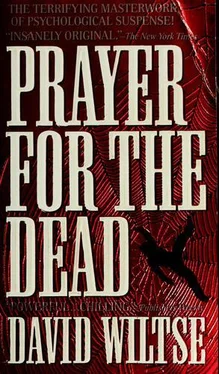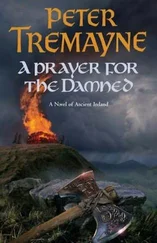David Wiltse - Prayer for the Dead
Здесь есть возможность читать онлайн «David Wiltse - Prayer for the Dead» весь текст электронной книги совершенно бесплатно (целиком полную версию без сокращений). В некоторых случаях можно слушать аудио, скачать через торрент в формате fb2 и присутствует краткое содержание. Жанр: Триллер, на английском языке. Описание произведения, (предисловие) а так же отзывы посетителей доступны на портале библиотеки ЛибКат.
- Название:Prayer for the Dead
- Автор:
- Жанр:
- Год:неизвестен
- ISBN:нет данных
- Рейтинг книги:4 / 5. Голосов: 1
-
Избранное:Добавить в избранное
- Отзывы:
-
Ваша оценка:
- 80
- 1
- 2
- 3
- 4
- 5
Prayer for the Dead: краткое содержание, описание и аннотация
Предлагаем к чтению аннотацию, описание, краткое содержание или предисловие (зависит от того, что написал сам автор книги «Prayer for the Dead»). Если вы не нашли необходимую информацию о книге — напишите в комментариях, мы постараемся отыскать её.
Prayer for the Dead — читать онлайн бесплатно полную книгу (весь текст) целиком
Ниже представлен текст книги, разбитый по страницам. Система сохранения места последней прочитанной страницы, позволяет с удобством читать онлайн бесплатно книгу «Prayer for the Dead», без необходимости каждый раз заново искать на чём Вы остановились. Поставьте закладку, и сможете в любой момент перейти на страницу, на которой закончили чтение.
Интервал:
Закладка:
“A regular Norwegian squarehead,” Dysen would say. “My mother used to cut our hair, practically scalp us, and those were the days when everyone’s hair was short. Everybody had big ears; look at the old pictures. But I was worse than most, practically a Dumbo, and don’t think the kids didn’t give me shit for it.”
And then his mood would turn darker as he recalled the slights of his youth. “I’d get back at them, though, don’t worry. They could laugh and fart around during class, but I’d be waiting for them after school. Your old man knew how to take care of himself, don’t you worry about that, old Rodger-Dodger.” He would sometimes try to return to the lighter mood, but the moment was past and Dyce had been reminded of the paranoia and anger lurking always just a fraction of an inch from the surface. He would no longer laugh with his father and that seemed to make the older man angrier.
The man behind the counter turned and the resemblance vanished. He had a round, vacuous face, a countenance without contrast of bone or flesh. His name tag read Tad.
Dyce lay his new driver’s license on the counter. “I’d like a compact car,” he said.
“Certainly, Mr… Cohen. Do you have a major credit card, please.”
Dyce produced a Visa card, as freshly minted as the driver’s license, also issued to Roger Cohen. This was the first test of the license since he had bought it for one hundred dollars two days earlier. He had already used the Visa card to get a cash advance against a nonexistent credit line of five thousand, some of which he used to pay for the license and credit card.
Dyce watched closely for any sign of suspicion as Tad went through the paperwork to release the car. If he had any doubts about the authenticity of the documents, none showed on his placid face.
He smiled routinely as he handed the cards back and gave Dyce the keys to his rented vehicle. Dyce carefully replaced the cards in his wallet, an item as new as the cards themselves. Everything about Dyce was new now, from the clothes he wore to the papers in his pockets, all of it financed with the several new cards in his wallet. The bruises on his face had nearly vanished, and the moustache, enhanced with mascara for the driver’s-license photo, was coming in nicely.
Once in the car and on his way out of Bridgeport, Dyce finally relaxed. The ease and simplicity of it all scared him more than anything. To think that an underworld of minor thugs and petty hoods could elude the system so efficiently. He could imagine how his grandfather would have inveighed against them, and how his father would have given them grudging admiration.
It was not until he reached New Haven and turned north on Interstate 91 that Dyce realized he had been automatically assessing Tad, the car-rental clerk. I must be crazy, he thought, thinking about that now. There was no time for it; he was being pursued. It was insane to even think about it and besides, he had vowed to put all of that behind him. It was not as if he had to do it. Surely he was enough in control of his emotions to deny himself such a dangerous pleasure. Especially in view of the disruption it had just caused. He promised himself to give it up, to give up even thinking about it. This was the perfect opportunity to start fresh in every way. The past was behind him now and he would keep it there; he was certain he could do it. He would shed the old skin and put on a new one as easily as he had slipped out of the hospital and created a new identity.
There is no way they will ever find me if I behave myself, Dyce thought. Criminals are creatures of habit; that’s how they are caught, everyone knows that. I am not a criminal, in the first place, and in the second I am too bright to let myself do anything stupid. He remembered the man in his hospital room, the one whose eyes seemed to cleave through Dyce’s skull. That man was the danger, Dyce thought. The Others do not frighten me. I could walk past them as if invisible-but the one with the searching eyes… He tried not to think about it.
After an hour Dyce stopped in the town of Waverly. Within five minutes he had located an independent insurance agent working out of a real-estate office, and asked to be taken on part-time as a salesman. The real-estate agent, happily surprised to find a man who was willing to canvass clients as well as do administrative work, hired him immediately.
“Do you know how to work one of these?” the agent asked, patting the personal computer terminal on his desk.
“Some,” said Dyce. “I’m sure I could learn what I need to.”
“I’m sure you could, too,” said the agent. “You seem like a bright guy to me.”
Dyce ran a hand over the terminal as if he were stroking an animal.
“Nice machine,” he said.
His father’s grave was marked by a simple marble stone whose original reddish-brown hue had aged into a darkish pink that seemed inappropriate to Becker. He remembered helping his mother pick out the headstone at a time when she was scarcely capable of making the least decision and the proper headstone struck her as a very important one. Ultimately she had opted for the slight reddish tint over the plain gray because she felt it would reflect some of the softer side of the man. Becker was not aware there was a softer side. He was eighteen and remembered his father as a stem, unyielding maker and enforcer of family law.
“There was much more to your father than you knew,” his mother told him, echoing a sentiment she had expressed to the rebellious boy throughout his teenage years. “He had a very sensitive side, too.”
Even now, many years later, Becker found his mother’s statement hard to believe except as an abstraction: Men can show more sensitivity to their wives than to their adolescent sons. But in reality he could not see how that could apply to his father. In his memories, Becker could never conjure up his father’s face. The man was always a looming presence, something large and dark and forbidding just at the edge of Becker’s awareness. He pictured the presence behind him, watching, and somehow in the frame of a doorway, as if just entering. Or just catching the young Becker in the act of something. “Authority,” Becker said to himself now, laughing inwardly as he heard the word coming in Gold’s voice. That looming presence you feel as your father is why you have such difficulty with authority today.
Typical of Gold, Becker thought. Quick and easy and cliched-but possibly right nonetheless.
A bird landed on the tombstone next to his father’s and cocked an eye at Becker briefly before taking to the air again, the white underside of its tail flashing intermittently like a burst of Morse code.
His mother’s stone was a plain gray. Becker had selected it himself ten years after the first one. She had possessed a softer side, too, no doubt, but it was obscured by his father’s shadow. And unlike his father, his mother had no advocate to sing her praises or hold forth for her better aspects. The only thing Becker could recall his father ever said about his wife was in praise of her industry, not her feminine sensitivity.
“Your mother works hard enough without your adding to it,” he had said, referring to some mess or other of the young Becker’s. Indeed, everything Becker did seemed to be resented by one or the other of them as adding to their burdens in life. Becker himself felt like the biggest burden of all, one borne out of duty rather than love or pleasure.
Some people should not have children, Becker thought, including himself in the proscription. They haven’t the gift or the patience for it and they do a bad job. Without knowing they’re botching it, probably. With reasonably good will and decent intentions.
Becker had been squatting on his haunches before the graves. He stood now and looked down at them, two grassy plots marked off at head and foot by stone but bordered laterally only in the mind, part of the broad sweep of tended grass, indistinguishable. Part of the lawn now, Becker thought. Surviving only in my memory, and there only infrequently. But alive in the way an artist lives on in his work; their handicraft walks above them now in the twisted framework of my psyche.
Читать дальшеИнтервал:
Закладка:
Похожие книги на «Prayer for the Dead»
Представляем Вашему вниманию похожие книги на «Prayer for the Dead» списком для выбора. Мы отобрали схожую по названию и смыслу литературу в надежде предоставить читателям больше вариантов отыскать новые, интересные, ещё непрочитанные произведения.
Обсуждение, отзывы о книге «Prayer for the Dead» и просто собственные мнения читателей. Оставьте ваши комментарии, напишите, что Вы думаете о произведении, его смысле или главных героях. Укажите что конкретно понравилось, а что нет, и почему Вы так считаете.












